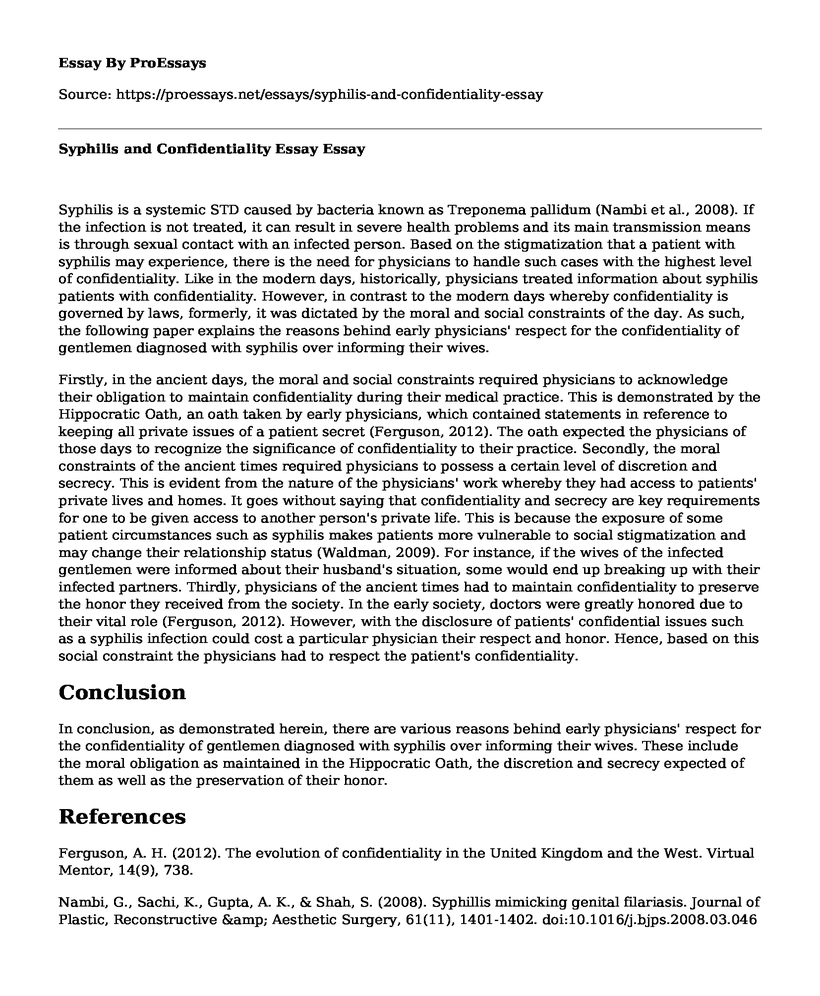Syphilis is a systemic STD caused by bacteria known as Treponema pallidum (Nambi et al., 2008). If the infection is not treated, it can result in severe health problems and its main transmission means is through sexual contact with an infected person. Based on the stigmatization that a patient with syphilis may experience, there is the need for physicians to handle such cases with the highest level of confidentiality. Like in the modern days, historically, physicians treated information about syphilis patients with confidentiality. However, in contrast to the modern days whereby confidentiality is governed by laws, formerly, it was dictated by the moral and social constraints of the day. As such, the following paper explains the reasons behind early physicians' respect for the confidentiality of gentlemen diagnosed with syphilis over informing their wives.
Firstly, in the ancient days, the moral and social constraints required physicians to acknowledge their obligation to maintain confidentiality during their medical practice. This is demonstrated by the Hippocratic Oath, an oath taken by early physicians, which contained statements in reference to keeping all private issues of a patient secret (Ferguson, 2012). The oath expected the physicians of those days to recognize the significance of confidentiality to their practice. Secondly, the moral constraints of the ancient times required physicians to possess a certain level of discretion and secrecy. This is evident from the nature of the physicians' work whereby they had access to patients' private lives and homes. It goes without saying that confidentiality and secrecy are key requirements for one to be given access to another person's private life. This is because the exposure of some patient circumstances such as syphilis makes patients more vulnerable to social stigmatization and may change their relationship status (Waldman, 2009). For instance, if the wives of the infected gentlemen were informed about their husband's situation, some would end up breaking up with their infected partners. Thirdly, physicians of the ancient times had to maintain confidentiality to preserve the honor they received from the society. In the early society, doctors were greatly honored due to their vital role (Ferguson, 2012). However, with the disclosure of patients' confidential issues such as a syphilis infection could cost a particular physician their respect and honor. Hence, based on this social constraint the physicians had to respect the patient's confidentiality.
Conclusion
In conclusion, as demonstrated herein, there are various reasons behind early physicians' respect for the confidentiality of gentlemen diagnosed with syphilis over informing their wives. These include the moral obligation as maintained in the Hippocratic Oath, the discretion and secrecy expected of them as well as the preservation of their honor.
References
Ferguson, A. H. (2012). The evolution of confidentiality in the United Kingdom and the West. Virtual Mentor, 14(9), 738.
Nambi, G., Sachi, K., Gupta, A. K., & Shah, S. (2008). Syphillis mimicking genital filariasis. Journal of Plastic, Reconstructive & Aesthetic Surgery, 61(11), 1401-1402. doi:10.1016/j.bjps.2008.03.046
Waldman, S. D. (2009). Patient Confidentiality. Pain Review, 672. doi:10.1016/b978-1-4160-5893-9.00353-1
Cite this page
Syphilis and Confidentiality Essay. (2022, May 09). Retrieved from https://proessays.net/essays/syphilis-and-confidentiality-essay
If you are the original author of this essay and no longer wish to have it published on the ProEssays website, please click below to request its removal:
- Riverbed City: The Ruby Lake Evacuation Mission
- Case Study Example on Oral Self-care
- Investigating Infectious Diseases in Hospital Settings. Paper Example.
- Intervention for Children With Synethesia: The Girl Who Heard Colors Essay
- Effective Learning Program for Healthcare Practitioners: Addressing the Challenges of Opioid Treatment at SAMC
- Nursing Leaders: Educating Nurses for Evidence-Based Practice in Hospitals - Research Paper
- Essay on 33% of Americans Suffer High Stress Levels: Impact on Health







